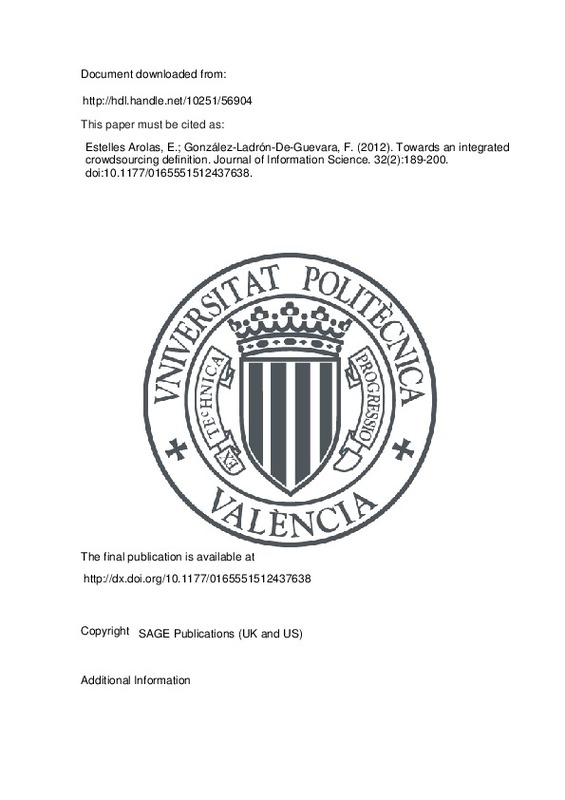Vukovic, M., & Bartolini, C. (2010). Towards a Research Agenda for Enterprise Crowdsourcing. Leveraging Applications of Formal Methods, Verification, and Validation, 425-434. doi:10.1007/978-3-642-16558-0_36
Brabham, D. C. (2008). Crowdsourcing as a Model for Problem Solving. Convergence: The International Journal of Research into New Media Technologies, 14(1), 75-90. doi:10.1177/1354856507084420
Vukovic, M. (2009). Crowdsourcing for Enterprises. 2009 Congress on Services - I. doi:10.1109/services-i.2009.56
[+]
Vukovic, M., & Bartolini, C. (2010). Towards a Research Agenda for Enterprise Crowdsourcing. Leveraging Applications of Formal Methods, Verification, and Validation, 425-434. doi:10.1007/978-3-642-16558-0_36
Brabham, D. C. (2008). Crowdsourcing as a Model for Problem Solving. Convergence: The International Journal of Research into New Media Technologies, 14(1), 75-90. doi:10.1177/1354856507084420
Vukovic, M. (2009). Crowdsourcing for Enterprises. 2009 Congress on Services - I. doi:10.1109/services-i.2009.56
Doan, A., Ramakrishnan, R., & Halevy, A. Y. (2011). Crowdsourcing systems on the World-Wide Web. Communications of the ACM, 54(4), 86. doi:10.1145/1924421.1924442
Brabham, D. C. (2008). Moving the crowd at iStockphoto: The composition of the crowd and motivations for participation in a crowdsourcing application. First Monday, 13(6). doi:10.5210/fm.v13i6.2159
Huberman, B. A., Romero, D. M., & Wu, F. (2009). Crowdsourcing, attention and productivity. Journal of Information Science, 35(6), 758-765. doi:10.1177/0165551509346786
Andriole, S. J. (2010). Business impact of Web 2.0 technologies. Communications of the ACM, 53(12), 67. doi:10.1145/1859204.1859225
Denyer, D., Tranfield, D., & van Aken, J. E. (2008). Developing Design Propositions through Research Synthesis. Organization Studies, 29(3), 393-413. doi:10.1177/0170840607088020
Egger, M., Smith, G. D., & Altman, D. G. (Eds.). (2001). Systematic Reviews in Health Care. doi:10.1002/9780470693926
Tatarkiewicz, W. (1980). A History of Six Ideas. doi:10.1007/978-94-009-8805-7
Cosma, G., & Joy, M. (2008). Towards a Definition of Source-Code Plagiarism. IEEE Transactions on Education, 51(2), 195-200. doi:10.1109/te.2007.906776
Brabham, D. C. (2009). Crowdsourcing the Public Participation Process for Planning Projects. Planning Theory, 8(3), 242-262. doi:10.1177/1473095209104824
Alonso, O., & Lease, M. (2011). Crowdsourcing 101. Proceedings of the fourth ACM international conference on Web search and data mining - WSDM ’11. doi:10.1145/1935826.1935831
Bederson, B. B., & Quinn, A. J. (2011). Web workers unite! addressing challenges of online laborers. Proceedings of the 2011 annual conference extended abstracts on Human factors in computing systems - CHI EA ’11. doi:10.1145/1979742.1979606
Grier, D. A. (2011). Not for All Markets. Computer, 44(5), 6-8. doi:10.1109/mc.2011.155
Heer, J., & Bostock, M. (2010). Crowdsourcing graphical perception. Proceedings of the 28th international conference on Human factors in computing systems - CHI ’10. doi:10.1145/1753326.1753357
Heymann, P., & Garcia-Molina, H. (2011). Turkalytics. Proceedings of the 20th international conference on World wide web - WWW ’11. doi:10.1145/1963405.1963473
Kazai, G. (2011). In Search of Quality in Crowdsourcing for Search Engine Evaluation. Advances in Information Retrieval, 165-176. doi:10.1007/978-3-642-20161-5_17
La Vecchia, G., & Cisternino, A. (2010). Collaborative Workforce, Business Process Crowdsourcing as an Alternative of BPO. Lecture Notes in Computer Science, 425-430. doi:10.1007/978-3-642-16985-4_40
Liu, E., & Porter, T. (2010). Culture and KM in China. VINE, 40(3/4), 326-333. doi:10.1108/03055721011071449
Oliveira, F., Ramos, I., & Santos, L. (2010). Definition of a Crowdsourcing Innovation Service for the European SMEs. Lecture Notes in Computer Science, 412-416. doi:10.1007/978-3-642-16985-4_37
Porta, M., House, B., Buckley, L., & Blitz, A. (2008). Value 2.0: eight new rules for creating and capturing value from innovative technologies. Strategy & Leadership, 36(4), 10-18. doi:10.1108/10878570810888713
Ribiere, V. M., & Tuggle, F. D. (Doug). (2010). Fostering innovation with KM 2.0. VINE, 40(1), 90-101. doi:10.1108/03055721011024955
Sloane, P. (2011). The brave new world of open innovation. Strategic Direction, 27(5), 3-4. doi:10.1108/02580541111125725
Wexler, M. N. (2011). Reconfiguring the sociology of the crowd: exploring crowdsourcing. International Journal of Sociology and Social Policy, 31(1/2), 6-20. doi:10.1108/01443331111104779
Whitla, P. (2009). Crowdsourcing and Its Application in Marketing Activities. Contemporary Management Research, 5(1). doi:10.7903/cmr.1145
Yang, J., Adamic, L. A., & Ackerman, M. S. (2008). Crowdsourcing and knowledge sharing. Proceedings of the 9th ACM conference on Electronic commerce - EC ’08. doi:10.1145/1386790.1386829
Brabham, D. C. (2010). MOVING THE CROWD AT THREADLESS. Information, Communication & Society, 13(8), 1122-1145. doi:10.1080/13691181003624090
Giudice, K. D. (2010). Crowdsourcing credibility: The impact of audience feedback on Web page credibility. Proceedings of the American Society for Information Science and Technology, 47(1), 1-9. doi:10.1002/meet.14504701099
Stewart, O., Huerta, J. M., & Sader, M. (2009). Designing crowdsourcing community for the enterprise. Proceedings of the ACM SIGKDD Workshop on Human Computation - HCOMP ’09. doi:10.1145/1600150.1600168
Maslow, A. H. (1943). A theory of human motivation. Psychological Review, 50(4), 370-396. doi:10.1037/h0054346
Veal, A. J. (Ed.). (2002). Leisure and tourism policy and planning. doi:10.1079/9780851995465.0000
Dahlander, L., & Gann, D. M. (2010). How open is innovation? Research Policy, 39(6), 699-709. doi:10.1016/j.respol.2010.01.013
[-]







![[Cerrado]](/themes/UPV/images/candado.png)


